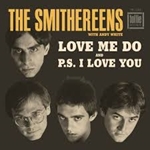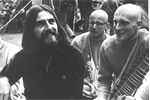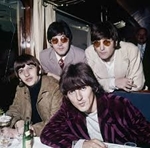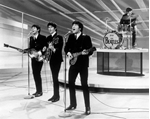- Register
- Log in to Tune-In
- Wishlist (0)
-
Shopping cart
(0)
You have no items in your shopping cart.
Beatles News

Paul McCartney was among the many artists to remember Rep. John Lewis following the death of the civil rights icon Friday at the age of 80.
“Sad to hear the news that civil rights legend John Lewis died yesterday,” McCartney tweeted Saturday. “He was such a great leader who fought with honesty and bravery for civil rights in America. Long may his memory remain in our hearts.”
McCartney added, “How about renaming the famous Pettus Bridge that he and Martin Luther King Jr. and others walked across in the 60s for the civil rights movement and rename it the John Lewis Bridge?!!!”
Source: Daniel Kreps/rollingstone.com
details
When The Smithereens make music, they do it right. And it shines on their newest release, a special one-off two-song covers record of The Beatles’ 1962 single “Love Me Do” and “P.S. I Love You,” featuring session drummer Andy White, who originally performed on the two songs. Best of all for fanatics and collectors, the songs are available on 45 RPM vinyl, pressed on the Tollie label with picture sleeve, which pays tribute to original American release by the Fab Four.
The British Invasion sound permeates the Smithereens’ music, and it was a thrill for the band members to find out that White, one of the few who could actually claim to be the Fifth Beatle, had married an American woman and was living in New Jersey. The band became friendly with the legendary British drummer (Tom Jones, Herman’s Hermits, Petula Clark) and even had him guest on several special live shows before he passed away in 2015.
Source: Robert Dye/americansongwriter.com
details
Ken McNab's in-depth look at The Beatles' acrimonious final year is a detailed account of the breakup featuring the perspectives of all four band members and their roles. A must add to the collection of Beatles fans, AND IN THE END is full of fascinating information available for the first time.
McNab, in a compelling month-by-month chronology, reconstructs the seismic events of 1969, when The Beatles reached new highs of creativity and new lows of the internal strife that would ultimately destroy them. Between the pressure of being filmed during rehearsals and writing sessions for the documentary Get Back, their company Apple Corps facing bankruptcy, Lennon's heroin use and musical disagreements, the group was arguing more than ever before and their formerly close friendship began to disintegrate.
In the midst of this rancor, however, emerged the glorious disharmony of Let It Be and the ragged genius of Abbey Road, their incredible farewell love letter to the world.
Source: gratefulweb.com
details
Sir Ringo Starr nearly missed out on being one of The Beatles because he'd planned to move to America.
The music legend was working in a factory when, at the age of 19, he and a friend decided to take the plunge and emigrate, but they were put off when they saw how many forms they had to fill in, and the 80-year-old drummer often reflects on how different his life could have been.
He said: "I love the blues and wanted to go and live in Houston because I wanted to be where Lightnin' Hopkings was - my all-time favorite blues player.
"John and I went down to the embassy and we filled in all these forms - we were just teenagers filling in all these damned forms.
"So we filled them in and took them back to the embassy and they gave us more paperwork, with even more questions - sheets and sheets of it.
Source: Celebretainment/pressofatlanticcity.com
details
On October 9, 2011, The Beatles Paul McCartney married his third wife Nancy Shevell. At the time, the singer was 69 and Shevell was younger than him; aged 51.
McCartney, 78, and Shevell, 60, got married at London's Old Marylebone Town Hall with family and friends in attendance. It wasn’t expected that the former Beatle would marry again after he had a bitter divorce from his second wife.
McCartney had to pay out an alleged $35 million to Heather Mills in their divorce. What Shevell has in common with the musician’s first wife, Linda Eastman, is that she’s also an American.
Her father is Mike Shevell the owner of a transportation conglomerate which is estimated to be worth nearly half of a billion dollars. In 2011, the businesswoman served as the company's vice president.
She was also a board member of the Metropolitan Transportation Authority. Shevell, like Eastman, has also battled breast cancer.
Source: Junie Sihlangu/news.amomama.com
details
It is 1965 – four years before Here Comes The Sun, as it goes – and John, Paul, George and Ringo are sprinting down a London street while filming their hit movie Help!
The pics were taken after snapper Derek Bayes heard a commotion from his office and spotted the Fab Four’s antics on New Bond Street, Mayfair.
It was May 9, a quiet Sunday, and Derek had to be quick to capture pop’s biggest ever band.
The pictures, unpublished until now, reveal a hilarious day’s filming – affected largely by the band being stoned.
Ringo Starr, who has just turned 80, has blurry memories of making the film, directed by Dick Lester.
The drummer once said: “A hell of a lot of pot was being smoked while making the film. It was great. That helped make it a lot of fun. You can see a lot of red-eyed shots; they were red from the dope we were smoking. Dick knew very little would get done after lunch. We seldom got past the first line of the script.
Source: Julie McCaffrey/mirror.co.uk
details
George Harrison is one of the most famous religious converts in the history of rock music. Despite this, many fans don’t know why he decided to become a Hindu. Some people convert to another religion because they have mystical experiences or fall on hard times. George, on the other hand, went down a different spiritual path because of a visit to a restaurant.
George’s journey began when he was brought up as a Catholic. According to the book George Harrison on George Harrison, he associated Catholicism with pain and fear — though he acknowledged he may have “misinterpreted” his childhood religion. He stopped caring about Catholicism when he was 12 or 13. However, religion would become an important part of his life again someday — and George’s Catholic upbringing was clearly reflected in some of his solo music.
Source: cheatsheet.com
details

While many rank “Yesterday” among the greatest songs ever written, Paul McCartney didn’t want to release it as a Beatles single in 1965. Paul pointed to the arrangement, which featured a string quartet and no one from The Beatles other than him.
“We were a little embarrassed about it,” Paul later said in an interview from Beatles Anthology. “We were a rock ‘n’ roll band.” While The Who’s Pete Townshend might disagree with that take, Paul got his wish about “Yesterday” remaining a non-single (at least on the U.K. market).
The following year, Paul wrote another outstanding composition that ended up with a string accompaniment: “Eleanor Rigby.” But this time around producer George Martin suggested taking all the guitars out completely.
Source: cheatsheet.com
details

Sir Paul McCartney has said working with Sir Ringo Starr once again was “a sort of magic.”
The 78-year-old has paired up with Starr, 80, on Beautiful Night, a track from McCartney’s 1997 Flaming Pie album which is due for re-release.
The release is coming as part of the Paul McCartney Archive Collection which also sees 32 bonus audio tracks and a 128-page book containing previously unpublished images by Linda McCartney.
Starr’s contribution has now led to a new music video of Beautiful Night being released, as well as a new EP for the track.
Speaking to PA, McCartney explained: “I’d been saying to Ringo for years that it’d be great to do something, because we’d never really done that much work together outside The Beatles.
“One night Jeff (Lynne, Electric Light Orchestra co-founder) suggested, ‘Why don’t you get Ringo in?’ and I said, ‘OK.’ It just sort of happened.”
He continued: “I had this song Beautiful Night which I’d written quite a few years ago. I’d always liked it but I felt I didn’t quite have the right version of it.
Source: Kimberley Bond/standard.c details

After nearly a decade of strong work with The Beatles, could Ringo Starr pick one song with his favorite drumming? Ringo did, and he pointed to a track that never made it on a Beatles studio album. The song he picked was “Rain,” the B-side to 1966’s “Paperback Writer” single.
“I think it was the first time I used this trick of starting a break by hitting the hi-hat first instead of going directly to a drum off the hi-hat,” Ringo said in the Paul McCartney biography Many Years From Now. “I think I just played amazing.”
Indeed, Ringo shows off a few of his tricks on “Rain,” which John Lennon wrote (with an assist from Paul). But mostly it’s the energy Ringo brings to his fills that made the song such a highlight for him. And the track kicks off with a Ringo break.
Source: cheatsheet.com
details
Buckingham Palace released some very special gin this week and it looks like Ryan Reynolds wanted to make sure Paul McCartney got some.
The Green Lantern star appears to have sent the former Beatles singer/bassist and Rock and Roll Hall of Fame member a special order of Buckingham Palace Small Batch Dry gin. He posted the receipt to Instagram on July 14... but he made some slight alterations to the addresses on it. See if you notice anything about the addresses, payment method and shipping method below...
Ryan likes pranking other stars, and has often done similar things to Hugh Jackman. He's also pranked Paul like this before. Last year, just after meeting the legendary musician, he posted a photo of the two on Instagram, writing, "Have you ever had a dream to meet someone so badly and somehow it comes true? You're welcome, Paul."
Source: HELLO! Canada/ca.hellomagazine.com
details
The “Quiet” Beatle? Ha! While that particular sobriquet dogged George Harrison for nearly 40 years, here’s tangible proof that moniker was more in need a for quick nickname or (lazy journalism!).
The latest entry in Chicago Review’s Press’s essential “Musicians in Their Own Words” series features scores of interviews Harrison gave to newspapers and magazines, and on TV and radio appearances spanning the years 1962-2001.
Some of them are well-known in Beatles lore, other less, a handful were never before published, and some just rarities. In the last category, there’s a 1979 radio BBC radio session in with Harrison and Michael Jackson (???) in the studio discussing recent music from Foreigner, Bob Marley, and Cat Stevens in addition to their own stories.
Source: Bob Ruggiero/houstonpress.com
details

No innovator gets far without a little help from their friends. It’s well known The Beatles took influence from musical giants who came before them. At the same time, they took influence from contemporaries like the Moody Blues. Here’s how the Moody Blues’ Mike Pinder led John Lennon down the path to create “Strawberry Fields Forever.”It all starts with an instrument called the Mellotron. Firstly, according to the book Electronic and Experimental Music, Harry Chamberlain invented the Mellotron in 1947. The instrument sounds otherworldly to many fans. Subsequently, Mellotrons gained popularity after Streetly Electronics began manufacturing them. Mike Pinder, a member of the Moody Blues, was also a salesman for Streetly Electronics. Predictably, his band started using the Mellotron in their music. In fact, the instrument became central to their album Days of Future Passed.
Source: cheatsheet.com
details
It was largely business as usual in last week’s Nielsen Music Midyear Report. Streaming is up, traditional album sales are down, vinyl’s heroic resurgence persists, and CDs and digital albums continue their death march into obscurity. Oh, and BTS is still crushing it.
The Korean pop septet’s new album, Map of the Soul: 7, is the bestselling physical album of the year and the only one to sell over 500,000 copies in the United States, more than doubling the sales of runner-up Kenny Chesney. Map of the Soul: 7 is also the ninth-biggest overall album of the year, moving 842,000 equivalent units derived from album sales, track downloads and streams.
Additionally, BTS landed at No. 2 among all pop artists in terms of total consumption, right behind Billie Eilish. In total, the boy band has moved 1.417 million album-equivalent units through the first half of 2020. Only one other group has eclipsed 1 million album units in the U.S., and they’re a group to which BTS often gets compared: The Beatles.
Source: Bryan Rolli/forbes.com
details
Ringo Starr's role as a glue guy in the Beatles was confirmed once they began solo careers. Long after the group split, his individual sessions drew far-flung former members back together once more.
Along the way, the affable drummer came to dominate the list of Top 25 Partial-Beatles Reunion Songs. Seven tracks come courtesy of Starr's solo projects; he's also a regular presence on tracks with George Harrison, John Lennon and Paul McCartney.
At least half the Beatles are present for many of these tracks, and in several instances three of the four ex-bandmates appear. The most famous are the so-called "Three-tles" reunion songs in the '90s, as the others came together to complete a pair of the late Lennon's songs.
Other notable partial reunions date from just after the group's 1970 breakup through modern-era collaborations as recent as the '10s. Several even include classic-era producer George Martin.
Source: ultimateclassicrock.com
details